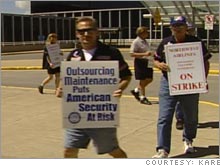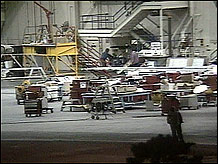 |
| Northwest Airlines said it can use replacement workers "indefinitely" to do the work of striking aircraft mechanics. |
|
|
|
|
|
|
|

|
| Low-cost airlines are outsourcing maintenance jobs to cut costs wherever possible. CNN's Lisa Sylvester reports (August 23) |
Play video
|
|
|
|
NEW YORK (CNN/Money) -
Northwest Airlines goes into the sixth day of mechanics strike saying it can rely on replacement workers "indefinitely."
The nation's No. 4 airline has used a combination of about 1,200 replacement workers, as well as 300 members of management and a number of outside contractors, to keep flying close to its normal schedule.
A statement from the airline said the replacement workers have not yet been made permanent employees, and the company would not comment on when or if that might happen. The replacement workers are primarily in use at its hubs in Minneapolis-St. Paul and Detroit, with outside contractors providing maintenance and other services at the other U.S. airports served by the airline.
Philip Baggaley, Standard & Poor's senior airlines credit analyst, said that he believes Northwest is committed to outsourcing aircraft cleaning and some other non-maintenance duties, as well as well as the maintenance work outside of its two main hubs.
"There would be increased outsourcing even if the strike was settled," he said.
Baggaley believes most members of the Aircraft Mechanics Fraternal Association (AMFA), other than the maintenance workers at the two hubs, have probably already lost their jobs, and he would expect Northwest to issue an ultimatum to hub maintenance members in about a week to return to work or have the replacement workers permanently take their positions.
Many of the replacement workers are former airline mechanics who lost their jobs as the industry cut capacity and employment since the Sept. 11 terrorist attacks. Northwest said that the replacement workers have an average of 14 years of experience.
The airline said it needed $176 million in annual labor cost concessions from the AMFA, which represented 4,400 employees at Northwest before the strike. The company's final offer would have cut the top hourly wage of AMFA members by 25 percent to $27.28, from $36.39. Reuters reported that the replacement workers are being paid $26.53 an hour.
The union said the company's proposal would have resulted in more than half their remaining members at Northwest being laid off, on top of more than 5,000 who it said lost their jobs there since Sept. 11. The union also said it made an offer that would have saved the airline the money it was seeking without job cuts, but Northwest says the union offer would only have resulted in savings of close to $100 million a year.
On-time performance improving?
The airline has refused to release information on flight cancellations or delays since the strike started early Saturday morning. Its most recent statement on operations said that 99.5 percent of confirmed passengers on Tuesday were able to complete their travel.
The previous day it said it operated 96.9 percent of its Monday flights, suggesting a cancellation rate more than twice its normal 1.2 percent before the strike started.
Union officials have suggested that the airline will face greater problems with cancellation as maintenance problems mount. Aircraft are allowed to fly a certain number of days with non-critical maintenance problems, but after three to five days the problem must be fixed or the aircraft has to be grounded.
The delays the airline is seeing also can cause future cancellations because pilots have limits on how many hours they can work. Flight crews are considered on duty whether they are flying or on the ground waiting for an aircraft to be ready, so delays can lead to future flight cancellations if there are not enough pilots available.
A business travel Web site, Joe Sent Me.com, has been conducting a survey of 99 Northwest flights each day since the strike started, and it has seen an average cancellation rate of 3 percent, about the same as airline's statement about Monday's operations. It says that the airline has had only 52.7 percent of flights arrive on time since the strike started, although those rates have improved the last two days, with a 58.5 percent on-time rate on Tuesday and a 67.5 percent rate on Wednesday.
The average delay of the flights that do not arrive on time is also dropping, down to 33.8 minutes on Tuesday and 33.6 minutes Wednesday, after an average delay of close to an hour the first three days of the strike.
The average length of the delay is actually better than the "typical" Northwest delay. According to the federal Bureau of Transportation Statistics, Northwest's average delay for flights at least 15 minutes late was 48 minutes during the first six months of this year. But the percentage of on-time flights still trails the airline's 79.3 percent on-time performance during the first half of the year.
Joe Brancatelli, the site's editor and publisher, termed the latest performance by Northwest as "miserable," although he added that "given Northwest's dreary earlier performances during the strike, even miserable looks decent now."
Northwest has dismissed the Web site's survey of flights as unscientific. But FlightStats, a service that compiles computerized flight information from the Federal Aviation Administration and the various computerized reservation systems, found pretty similar on-time performance for Northwest the first three days of the strike looking at the full range of Northwest flights, not just a sample.
Both the Joe Sent Me survey and FlightStats found a 47 percent on-time record on Saturday and a 53 percent on-time performance Sunday. There was a split on Monday, with the Joe Sent Me survey calculating only a 38 percent on-time record while FlightStats found a 58 percent on time performance. FlightStats gave it a 53 percent on-time performance the first three days of the strike, the most recent data it has available, while the Joe Sent Me survey put the on-time performance at 46 percent for that period.
Two major corporate travel agents said that so far her customers are not fleeing Northwest, despite the delays.
"We don't have one corporate customer or travel manger who has given us an order to book away from Northwest," said Dee Runyan, executive vice president of WorldTravel BTI. "If the numbers are right and half the flights are arriving late, there will be concerns. But I think they (Northwest) will get a pass probably for the next week."
Jack O'Neill, Chief Operating Officer. Carlson Wagonlit Travel, said one thing working for Northwest in terms of business travel is that the last half of August is one of the slowest periods of the year for business travel.
"They'll have a test the first week after Labor Day, but I think they know that and are prepared for that," he said.
O'Neill said that his impression is also that the problems with delays have been improving as the week has progressed, and that an average delay of an hour or less probably doesn't upset business travelers too much.
"Anybody who's a regular business traveler has their own personal barometer, but anything within the hour is fine with me. I don't schedule things that tight," he said.
For a look at the broader implications the Northwest strike, click here.

|